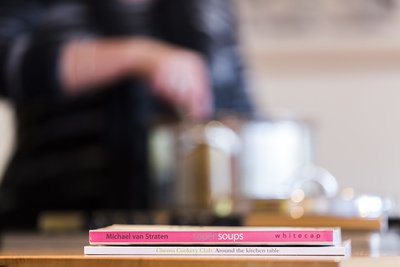This week is a continuation of last week, looking at ways that we can boost the immune system through food choice.
Mushrooms
I ended last week by giving you a recipe using mushrooms, Shiitake, cordyceps and Reishi are the varieties to try and use. Research would tell us that they contain compounds, one in particular called beta glucan, that boosts immunity, slows tumour growth and lessen the side effects of cancer treatment. Studies claim that they also help reduce cholesterol. It is generally recommended that you try and eat them 3-4 times a week. Of course you do not have to go to the lengths of making a risotto. It could be as simple as a mushroom omelette, or mushrooms on toast or adding them to a bolognese type sauce. May be worth a try.
Sauerkraut
I have had an interesting week. On Friday I went to the Penny Brohn Cancer Care Centre in Bristol on a continual professional development course. I do these courses frequently to keep abreast with the ever changing subject of nutrition. This particular course was focussing on vitamin D. That aside I got talking to the nutritional therapists that work at the centre and happened to mention that I was blogging on foods and immunity and they asked if I had considered sauerkraut. How interesting I thought as I have not personally heard about its benefits. Well true to form I came home and did my homework and sure enough sauerkraut has been used for centuries as an immune booster. How interesting because it is not a food that we automatically include in our normal diet. It contains phytochemicals that are created during the fermentation process.
A study published in the Journal of Agricultural and Food Science concluded that sauerkraut is a cancer inhibitor. The study showed that the fermentation of the cabbage produced a compound which was responsible for this. A more recent study by the American Cancer Research concurred with this.
It is also hugely beneficial in balancing the bacteria in the gut. This is more often than not disrupted by treatment. It contains the beneficial bacteria lactobacilli plantarum which boosts the immune system by increasing antibodies that fight infection. All good stuff.
So perhaps some sauerkraut in the diet may be a good idea. It could be used hot as an extra vegetable, used in a stir fry or mixed into a casserole. I did find a cake recipe using it but think that is a step too far.
Garlic
I have to mention garlic here. I appreciate that not everyone enjoys garlic but it has been shown to be very beneficial and promoted as containing anti cancer compounds, one in particular is called Allicin. Garlic stimulates the production of white blood cells and acts against a wide range of non beneficial bacteria, fungi, parasites and viruses. There are many arguments as to whether garlic should be raw or cooked in order to gain maximum benefit. I have always considered raw better. It is added to many dishes usually sauted with the onion at the beginning of a recipe. Well I usually leave the garlic out at this stage and add it to the dish at the end of the cooking time. This way it is fresher and hopefully more beneficial. I do not know whether you are aware but if you eat fresh parsley after garlic it is supposed to stop your breath smelling.
Vitamin C
Finally I want to mention: red peppers, broccoli, papaya, all berry fruits, cauliflower, citrus fruits and tomatoes.
They all have individual benefits but the common denominator here is vitamin C. Again this has been used for many years as a powerful immune booster. I know people who feel they are going down with a cold to boost their intake and it seems to help. Of course vitamin C is present in all fresh fruits and vegetables but the ones mentioned above seem to be richer in the vitamin.
Vitamin C is a primary antioxidant working alongside vitamin E, selenium and beta carotene which protect the cell from damage by toxins and free radicals. Vitamin C individually has several actions that may offer protection for the immune system. It protects the cell structure which is important for any cell including those of the immune system. It also protects the DNA (brain centre) of the cell.
Once the DNA is damaged the cell loses its ability to communicate properly and can then lead to mutation of the cell. Finally it helps to oxygenate cancer cells and as we have seen from other recent blogs cancer cells find it difficult to flourish in an oxygenated environment.
So where are we with our immune boosting recommendations?
To summarise eating 8-10 portions of fresh fruit and vegetables a day if you can is an excellent start. Try to include some of the foods that have been promoted as being immune boosting on a regular basis.
Below I have added a few simple recipes using some of these foods which I hope that you will
Rich garlic dressing.
4 tbsp balsamic vinegar
1 tbsp agave syrup
1 tsp Djon mustard
2 garlic cloves crushed.
Seasoning
150mls olive oil
Whisk or hand blend the vinegar, syrup, mustard, garlic and seasoning with a little oil. Then add the remaining oil a little at a time until the dressing starts to thicken. Add remaining oil slowly beating or whisking well as you do.
Carrot and beetroot salad.
300g carrots grated.
300g fresh beetroot grated.
1 tbsp fresh ginger root finely chopped.
2 tbsp olive oil
4 tbsp lemon juice.
garnish; 3 tbsp roasted sunflower seeds plus 3 tbsp roasted pumpkin seeds.
Simply mix all of the ingredients together, sprinkle on the seeds and serve.
Blog originally written by Caroline July 2012



